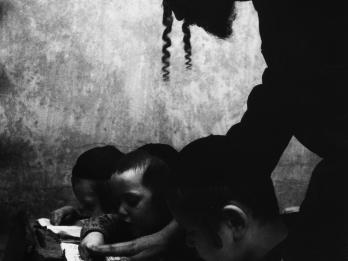Founding Charter
Ḥevra Kadisha of Prague
16th Century
In the year five thousand three hundred twenty-four [1564] of the Creation of the World, when we are returned to the houses of our fathers from the four corners of the world. After the expulsion in the year 321 [1561], there was a destruction of the fortification of our community, and through the covetousness of our enemies, the community was devastated. This was overcome with great effort in the month of Nisan 322 [1562]. From this land people departed for other lands, and among those [who remained] a great number died, and among the members of the Holy Community in their affliction rose a tumult of sighs. For no one remained to bury the dead, save two hospital caretakers. And when someone died, whether he was important or not, they imposed on the relatives to give them an enormous fee for burial. And anyone who asked for someone to collect the deceased from his house for transport to his final resting place was forced to pay a huge sum to these two caretakers, who moreover did not conduct themselves with the respect owed to the dead. They cavorted and amused themselves on the way to the grave. This was so offensive to members of the community that they loathed their own existence; and they had to pay fees to these caretakers even though they were still alive, in good health, and in the flower of youth, and anyone who could not satisfy their exorbitant demand was left to groan many days and nights, so that bearing the dead to his grave became, for his friends and relations, a trial worse than death. And the indignation in our community was so profound that anyone who would agree to fulfill this duty would receive wages from the leaders. Thus came forth the faithful, the virtuous, and the pious, and they took their lives in their hands and presented an elaborate reply to the leaders of that generation that they desired to perform the desire of their Maker, according to the commandment: “I am the Lord who buries the dead.” But on the condition that the leaders of the Jewish Quarter pay them wages, and that this remuneration serve no common use but that they should set up a charity fund that would serve to defray the expenses of burials, distribute wood to the poor each year, and hand out charity to the poor twice a year, on the holidays of Pesaḥ [Passover] and Sukkot [the festival of booths], to distribute to the worthy poor as they see fit. And what is left over is to be deposited in the communal house to provide for three goals of our community:
- first, for the needs of annulling the expulsion and for avoiding all possible misfortunes that might result;
- second, for buying land to enlarge the cemetery of our community, or for anyone of our brothers of Israel who might come from any town where they live to ask for aid for their cemetery, not to fill their pockets, but to give them a small or large amount, according to the time and circumstances;
- third, in case of war, if it should happen unexpectedly, one must refer to the Law, which is committed to taking precautions against the adversary. Or to feed the poor in a period of quarantine and anything else.
Then the leaders, blessed the Lord, these honest men whom the Lord had inspired to do good for their people, and the Lord rewarded those who are good and honest, and He has given them an eternal law that must not be transgressed. The charity collectors decided that a third of the money from the funerals of every son [and daughter] of Israel taken to his final resting place will be put into the large charity fund of our community. And if there is a rich person, the community will ask him to contribute a certain sum, according to its estimate. All those who are to be buried will be obliged to give a certain sum to the community fund. And a quarter of the amount that the Council has estimated. Thus the princes of the community pledged to them that all this would remain binding for us and our children, and for all the generations of Israel that settle in the community of Prague.
Eliezer Ashkenazi, son of Rabbi Elia Roffe;
Mordekhai, son of Gershom Ha-Cohen;
Ḥayim, son of Isaac Ha-Cohen;
Abraham Moshe, son of Yeḥiel Winternitz;
Menaḥem, called Mendelika, son of David;
Yehuda, son of Gershom;
Schraga Feibl, “Gaf” Ha-Cohen;
Shmuel, son of Avner of Weisswasser, of the family Altschul;
Meir, son of Moshe Brandeis Ha-Levy;
Petaḥia, scribe, son of the martyr Rabbi Joseph, scribe of the community of Prague;
Ḥayim, son of Shmuel, beadle and faithful of the community of Prague.
The content of this document is recopied from an ancient copy, dated the year 449 [1689]. After the great fire that took place in the community, which burned all the documents and privileges, and in which only a single record remained after the fire was extinguished, and it was small and worn, and given its state could not have been preserved without being reproduced. And even this copy was torn and damaged, so it was written on parchment for the generations to come.
Notes
Words in brackets appear in the original translation.
Credits
Hevra Kadisha of Prague, Founding Charter, from Sylvie Anne Goldberg, Crossing the Jabbok, trans. Carol Cosman (Berkeley: University of California Press, 1996), pp. 78–79. Copyright © 1996 by The Regents of the University of California. Originally published as Les deux rives du Yabbok, copyright © 1989 Les Éditions de Cerf. Republished with permission of University of California Press, permission conveyed through Copyright Clearance Center, Inc.
Published in: The Posen Library of Jewish Culture and Civilization, vol. 5.



